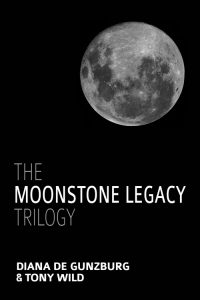by LIZ THOMSON
A self-published trilogy has been named as one of Lovereading’s Summer Reads, drawing early praise from figures as diverse as Michael Morpurgo, William Dalrymple and Anja C Anderson, Astronomer and Professor of Dark Cosmology at the University of Copenhagen.
The first volume in what is now The Moonstone Legacy by Diana de Gunzburg and Tony Wild (left), was in fact published in the UK by Pushkin Press in 2010 and in South Asia by Hachette India. Sales topped 6,500, more than credible for an ambitious first novel which has gathered fans in both the YA and adult markets. Pushkin having changed hands, the authors have now decided to self-publish the trilogy in one print volume, with a simultaneous ebook edition.
The novel’s appearance among Lovereading’s Summer reads is marked by the release of a new version of the 1960s hit “Age of Aquarius”, recorded in Paris by reggae singer Horace Andy, perhaps best-known in the UK for his cover of “Ain’t No Sunshine When You’re Gone”. De Gunzburg can be heard on the track reading passages from the novel.
Inspired by Wilkie Collins, The Moonstone Legacy is described by its authors as “part East/West epic, part historical fiction, part family saga, part mystery adventure, part spiritual exploration and part science fiction”, a multi-faceted opus the themes of which include gender equality and religious tolerance and the nature of the universe. Yet for composer Michael Berkeley, who reached for a musical analogy, it was also “a compulsive and entertaining read with gripping modulations every few bars.”
De Gunzburg and Wild first met in Yorkshire, at a party at her mother’s house. “I thought she was lovely, a great dancer – and a total fantasist. She told me tall stories about her childhood in northern Pakistan, about her great-grandfather having been hanged by the British, about her aristocratic white Russian grandmother who had escaped back to Russia after the Revolution, about her grandfather being murdered in his bed, about the huge cave in her father’s mountain with an ancient Buddhist temple inside and about daily life in the Frontier with its cast of hermaphrodite servants being swung from ceiling fans, deaf and dumb butlers, drivers recently gaoled with their camels, and the princely palace she played in.
“Looking as she did – more, like a beautiful Swede than my image of a subcontinental – made it all the easier to dismiss Diana’s stories as an update of The Arabian Nights.”
In fact de Gunzburg is Anglo-Russian and born in Pakistan, which presumably accounts for all those exotic tales. Wild had travelled in India, which gave rise to two popular histories – The East India Company and Remains of the Raj – and had also been a coffee buyer for Taylor’s of Harrogate, the family firm, which led to Coffee: A Dark History.
Since that first meeting, Wild and de Gunzburg have shared “so many creative journeys – physical and metaphysical, musical and visual. The Moonstone Legacy is the culmination of pretty much everything we’ve done together philosophically, spiritually, physically and virtually – such fun!”
It began, however, with the bed-time stories Wild told to de Gunzburg’s daughter, stories which “mutated, spurred on by Diana’s idea of an East-West contemporary story,” Wild explains. “I was searching for inspiration in my bookshelves and came across the last line of Wilkie Collins’ The Moonstone: ‘What will be the next adventure of the Moonstone? Who can tell?'”
It was “a eureka moment”. They scouted locations – in India and Spain and Sezincote, essentially a 200 year-old Mogul palace in the Cotswolds, the book’s main setting. They researched Asiatic lions, meteoric diamonds, Indian history, astronomy and cosmology, talking to experts in their fields, “which was really good fun”. As for the writing: “We walked and talked the book very thoroughly, in the French countryside, in Yorkshire, London and Paris. Then I did a rough draft of all the elements we’d agreed on before we both sat together in front of the computer and hacked through every single word,” says Wild.
The authors are hoping to work with Google Earth on a virtual treasure hunt, the prize being a 1,000-carat cubic zirconium model of the moonstone created by LED designer Moritz Waldemeyer. But that’s for the future – perhaps for the sequel.

Meanwhile, there’s that cover of “The Age of Aquarius”, which hippies will remember from the celebrated Sixties musical Hair. At a crucial moment in the book, a fictional DJ named Phil Solaris performs an improvised version of the hit as a meteoric diamonds falls to earth during a total eclipse. When French composer and DJ Philippe Cohen-Solal – best known for his work with the international group known as the Gotan Project – heard about this from his old friend de Gunzburg he decided to record a cover version. Enter Horace Andy – singing here as Phil Solaris.
“‘The Age of Aquarius’ was a natural fit for The Moonstone Legacy Trilogy,” a thrilled Wild told BookBrunch. “The song even has an uncannily relevant line about a ‘mystic crystal revelation’, and that’s what the Moonstone, a sacred Indian diamond, actually turns out to be.”
The Moonstone Legacy Trilogy is published by Wild publishing and is available in print (via Gardners) and digital formats.Get your copy of The Moonstone Legacy at Amazon.com today!

